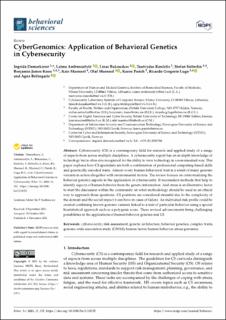| dc.contributor.author | Domarkiene, Ingrida | |
| dc.contributor.author | Ambrozaitytė, Laima | |
| dc.contributor.author | Bukauskas, Linas | |
| dc.contributor.author | Rančelis, Tautvydas | |
| dc.contributor.author | Sütterlin, Stefan | |
| dc.contributor.author | Knox, Benjamin James | |
| dc.contributor.author | Maennel, Kaie | |
| dc.contributor.author | Maennel, Olaf | |
| dc.contributor.author | Parish, Karen | |
| dc.contributor.author | Lugo, Ricardo Gregorio | |
| dc.contributor.author | Brilingaitė, Agne | |
| dc.date.accessioned | 2022-10-24T07:18:44Z | |
| dc.date.available | 2022-10-24T07:18:44Z | |
| dc.date.created | 2021-11-01T18:49:54Z | |
| dc.date.issued | 2021 | |
| dc.identifier.citation | Behavioral Sciences. 2021, 11 (11), Artikkel 152. | en_US |
| dc.identifier.issn | 2076-328X | |
| dc.identifier.uri | https://hdl.handle.net/11250/3027734 | |
| dc.description.abstract | Cybersecurity (CS) is a contemporary field for research and applied study of a range of aspects from across multiple disciplines. A cybersecurity expert has an in-depth knowledge of technology but is often also recognized for the ability to view technology in a non-standard way. This paper explores how CS specialists are both a combination of professional computing-based skills and genetically encoded traits. Almost every human behavioral trait is a result of many genome variants in action altogether with environmental factors. The review focuses on contextualizing the behavior genetics aspects in the application of cybersecurity. It reconsiders methods that help to identify aspects of human behavior from the genetic information. And stress is an illustrative factor to start the discussion within the community on what methodology should be used in an ethical way to approach those questions. CS positions are considered stressful due to the complexity of the domain and the social impact it can have in cases of failure. An individual risk profile could be created combining known genome variants linked to a trait of particular behavior using a special biostatistical approach such as a polygenic score. These revised advancements bring challenging possibilities in the applications of human behavior genetics and CS. | en_US |
| dc.language.iso | eng | en_US |
| dc.publisher | MDPI | en_US |
| dc.rights | Navngivelse 4.0 Internasjonal | * |
| dc.rights.uri | http://creativecommons.org/licenses/by/4.0/deed.no | * |
| dc.subject | cybersecurity | en_US |
| dc.subject | risk assessment | en_US |
| dc.subject | genetic architecture | en_US |
| dc.subject | behavior genetics | en_US |
| dc.subject | complex traits | en_US |
| dc.subject | genome-wide association study | en_US |
| dc.subject | GWAS | en_US |
| dc.subject | human factor | en_US |
| dc.subject | human behavior | en_US |
| dc.subject | stress genomics | en_US |
| dc.title | CyberGenomics: Application of behavioral genetics in cybersecurity | en_US |
| dc.type | Peer reviewed | en_US |
| dc.type | Journal article | en_US |
| dc.description.version | publishedVersion | en_US |
| dc.rights.holder | © 2021 by the authors. | en_US |
| dc.subject.nsi | VDP::Medisinske Fag: 700::Basale medisinske, odontologiske og veterinærmedisinske fag: 710::Medisinsk genetikk: 714 | en_US |
| dc.source.volume | 11 | en_US |
| dc.source.journal | Behavioral Sciences | en_US |
| dc.source.issue | 11 | en_US |
| dc.identifier.doi | 10.3390/bs11110152 | |
| dc.identifier.cristin | 1950407 | |
| dc.relation.project | The EEA and Norway Grants Fund for Regional Cooperation: LT08-2-LMT-K-01-051 | en_US |
| dc.source.articlenumber | 152 | en_US |
| cristin.ispublished | true | |
| cristin.fulltext | original | |
| cristin.qualitycode | 1 | |

